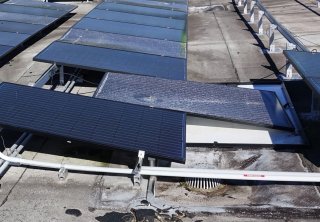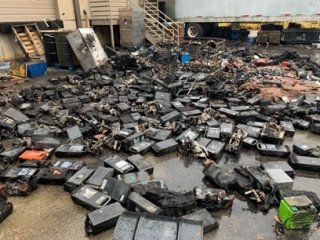Improving Recycling and Management of Renewable Energy Wastes: Universal Waste Regulations for Solar Panels and Lithium Batteries
EPA is planning to propose new rules to improve the management and recycling of end-of-life solar panels and lithium batteries. EPA is working on a proposal to add hazardous waste solar panels to the universal waste regulations found at Title 40 of the Code of Federal Regulations Part 273 and to establish a new, distinct category of universal waste specifically tailored to lithium batteries. To view the schedule for this rulemaking, please visit the Unified Regulatory Agenda entry for this action.
EPA supports the increased use of solar power and electric vehicles as integral emissions-free sources of energy and transportation. Like all energy production technologies, when solar panels and electric vehicle and other lithium batteries reach the end of their useful lives, their associated wastes must be responsibly recycled and managed. Recycling returns valuable critical minerals to the economy, both conserving resources and reducing the overall energy use needed to produce new solar panels and lithium batteries.
On this page:
Solar Panel Waste

Solar panels are safe when in use and maintained appropriately and some end of life solar panels are not likely hazardous waste under RCRA. However, some end-of-life solar panels contain enough metals, like lead, to meet the definition of hazardous waste under the Resource Conservation and Recovery Act. For these solar panels, EPA is drafting streamlined end-of-life management requirements to increase solar panel recycling while maintaining appropriate environmental protections through the proposed addition of solar panels to the universal waste regulations found at 40 CFR Part 273.
Management as universal waste will improve management of all solar panel waste whether hazardous waste or not. This change in the RCRA regulations would provide a clear, practical system for handling discarded solar panels. The streamlined universal waste regulations are expected to promote the collection and recycling of solar panels and encourage the development of municipal and commercial programs to reduce the quantity of these wastes going to municipal solid waste landfills.
EPA is developing this rule in response to the November 19, 2021, petition submitted by a broad coalition of industry associations affiliated with the electric power industry to add photovoltaic solar panels to the universal waste management program.
Lithium Battery Waste

EPA is working on a proposal for universal waste standards specially tailored for lithium batteries, separate from the existing general battery universal waste category. Though lithium batteries are generally safe when used, stored, and charged appropriately, these batteries can cause fires when improperly discarded or otherwise mismanaged at the end of their lives. Establishing a category of universal waste specifically for lithium batteries will improve safety standards and reduce fires from mismanaged end-of-life lithium batteries, while continuing to promote battery recycling. EPA is working on standards in line with current industry best practices to harmonize battery management across the industry.
EPA is updating these lithium battery universal waste standards in response to a 2021 EPA report on fires caused by lithium-ion batteries in the waste management process and feedback from a corresponding workshop.
Additional Resources
End-of-Life Solar Panels
For more information, visit:
- Recorded EPA webinar on solar panel recycling.
- Solar panel regulations and management webpage.
- Solar panel recycling webpage.
- Frequent questions on solar panels.
End-of-Life Lithium Batteries
For more information, visit:
- EPA used lithium-ion battery webpage.
- Frequent questions on lithium-ion batteries.
- Lithium-ion battery recycling webpage.
- Frequent questions about lithium-ion battery recycling.
- Battery Collection Best Practices and Battery Labeling Guidelines.
EPA released a Summary Report for the Lithium-Ion Batteries in the Waste Stream Workshops. These workshops were held on October 5, 2021, and October 19, 2021, as two half-day sessions.
EPA held two webinars on issues electronics recyclers and material recovery facilities are experiencing from li-ion batteries:
